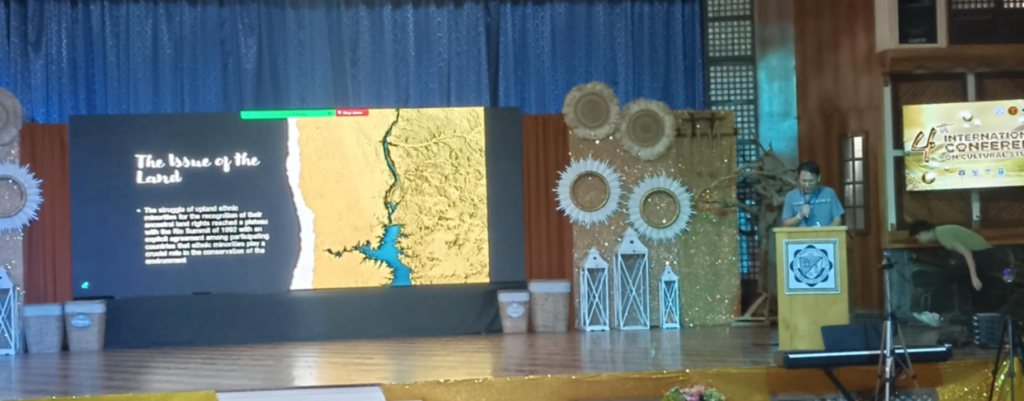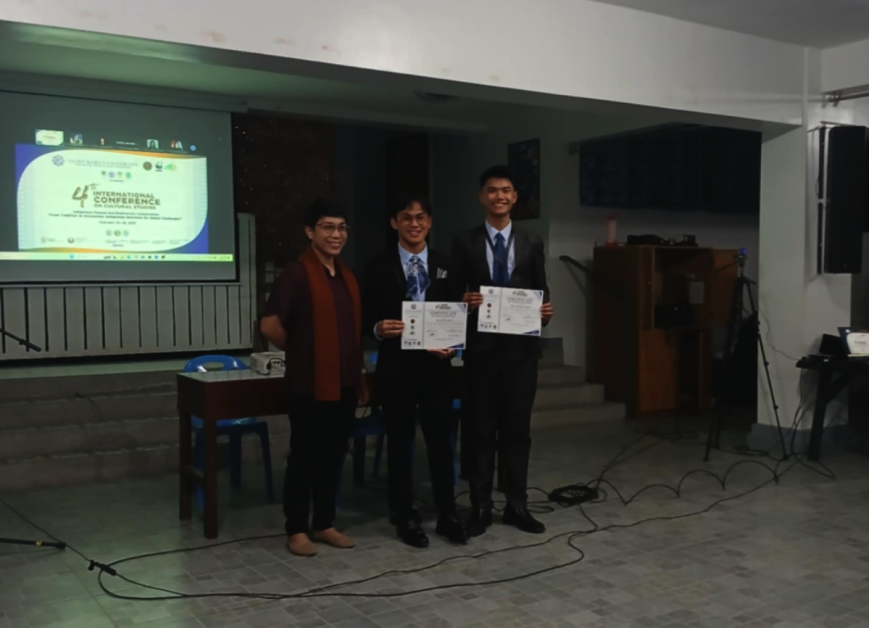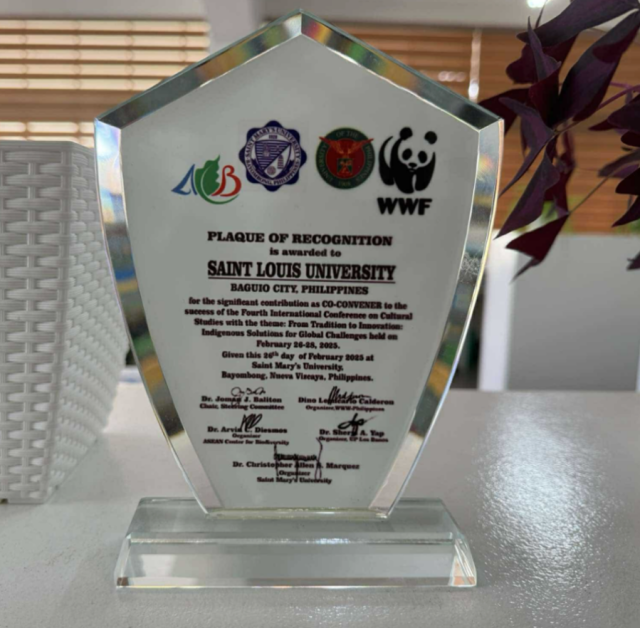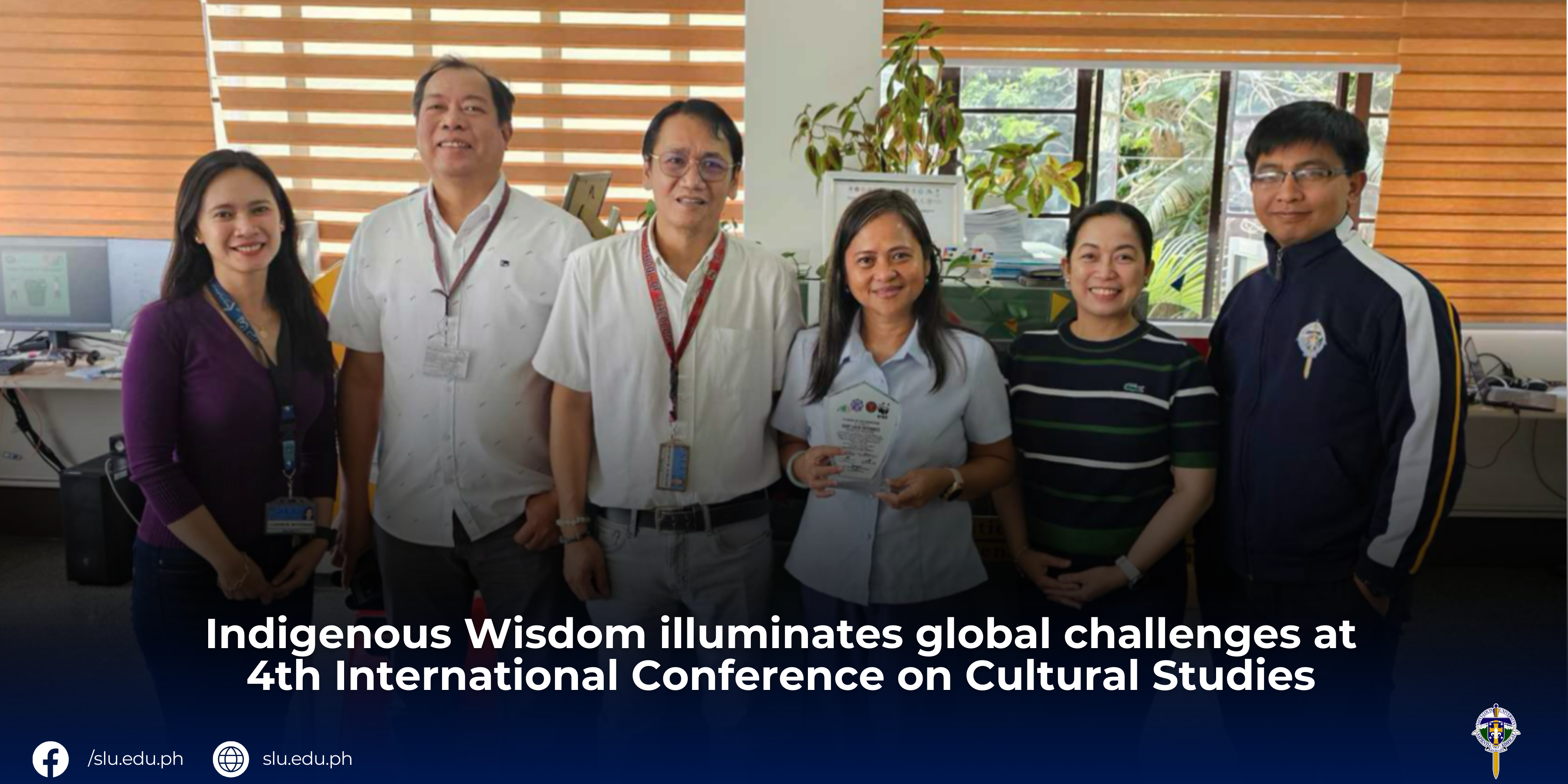In an era marked by rapid technological advancements and globalization, the wisdom of indigenous communities often stands at the periphery of mainstream discussions on sustainability, climate change, and cultural preservation. However, the 4th International Conference on Cultural Studies (FICCS), held at Saint Mary’s University in Bayombong, Nueva Vizcaya, from 26 to 28 February 2025, centered on and illuminated the indispensable role of indigenous knowledge in addressing some of the world’s most pressing challenges.
Themed “From Tradition to Innovation: Indigenous Solutions for Global Challenges,” the conference served as a dynamic platform for scholars, researchers, and community leaders to explore the convergence of traditional knowledge and contemporary problem-solving.
Contributions from Saint Louis University, Baguio
Underscoring its commitment to advancing research that integrates indigenous wisdom with contemporary ecological concerns, Saint Louis University (SLU), through the University Research and Innovation Center (UnRIC), co-hosted the 4th International Conference on Cultural Studies. As part of its commitment to academic excellence, SLU sent three presenters to showcase research conducted at the university.

Dr. Rico C. Jacoba from the School of Teacher Education and Liberal Arts (STELA), Religion Department, presented his research paper titled “Reclaiming Indigenous Beliefs and Practices for Environmental Stewardship and Sustainability in the Cordillera.” His study emphasized the importance of indigenous spiritual and cultural traditions in fostering environmental responsibility, offering a perspective that integrates faith and ecology.

Similarly, Dr. Jeoffrey M. Almazan presented his paper “Daga mi kataguan mi: Discoursing Laudato Si Towards a More Meaningful Indigenous Theology of Land in the Cordilleras.” His research explored the intersection of Pope Francis’ Laudato Si and indigenous worldviews, advocating for an eco-theological framework that acknowledges indigenous people’s deep spiritual connection to the land.


Jan Michael Aquino and Christian Johann Torres, students from the Nursing Department of the School of Nursing, Allied Health, and Biological Sciences (SONAHBS), along with their faculty promoter Associate Dean Elizabeth Bautista, PhD, presented their undergraduate research titled “The Effectiveness of Vestibular Stimulation in Reducing Academic Stress Among Student Nurses in School X.” This study aims to bridge the gap in existing research by examining the impact of vestibular stimulation on academic stress levels among student nurses, offering new insights for innovative stress management strategies in academic settings.
The Urgency of Indigenous Knowledge Systems
The conference highlighted the urgency of recognizing Indigenous Knowledge Systems and Practices (IKSPs) in biodiversity conservation, environmental stewardship, and cultural sustainability.
The first day was marked by plenary discussions led by notable scholars such as Dr. Zenaida Baoanan, who highlighted how indigenous peoples serve as custodians of biodiversity, and Dr. Shaun Awatere, who emphasized their adaptive strategies to climate change. The insights challenged the dominant narratives that often frame indigenous groups as mere remnants of the past, rather than active contributors to ecological resilience.
One of the most compelling themes was the idea that modern science and indigenous wisdom are not oppositional but complementary. For instance, while Western conservation strategies rely on quantitative data and technology, indigenous environmental management integrates spirituality, community governance, and lived experiences with nature. This was echoed by Ms. Anabelle Plantilla, who linked Philippine biodiversity to the United Nations Sustainable Development Goals (SDGs), demonstrating that indigenous practices align with international frameworks for sustainability.
Cultural Preservation as a Pathway to Innovation
Beyond ecological concerns, FICCS also focused on the intersection of cultural heritage and innovation. The parallel sessions explored topics such as the role of Ifugao traditions in sustainable tourism, the electoral participation of cultural communities and the contextualization of theology in the Cordilleras. These discussions revealed that preserving indigenous traditions does not mean resisting progress. Instead, it means ensuring that development is inclusive, ethical, and deeply rooted in cultural identity.
A prime example of this principle was evident in Dr. Jamel Kaur Singh’s discussion on how indigenous wisdom transcends mere historical nostalgia and offers practical frameworks for contemporary governance and environmental conservation. Similarly, For. Roger Haboc and For. Asami B. Segundo presented case studies of the Kalanguya-Ikalahan Ancestral Domain, demonstrating how indigenous forest management techniques outperform some state-led conservation projects in sustainability and efficiency.
The conference also emphasized the role of academic institutions in amplifying indigenous voices. As Dr. Arvin C. Diesmos argued in his keynote address on the second day, scientific research must shift from extracting knowledge from indigenous communities to engaging them as equal partners in environmental advocacy. This insight serves as a challenge to academia: to break away from extractive methodologies and instead foster knowledge co-creation that respects and empowers indigenous peoples.
The Role of Immersion and Direct Engagement
On the second day, the Environmental-Cultural Encounter in Imugan, Sta. Fe allowed participants to engage directly with indigenous communities, providing them with firsthand experiences of sustainable practices. This immersion emphasized the need for scholars and policymakers to go beyond theoretical discussions and engage in experiential learning.
Moreover, the workshop on Biodiversity Conservation led by Dr. Ming Kai Tan on the final day solidified the importance of transdisciplinary approaches. It illustrated that tackling ecological and social crises requires integrating science, policy, culture, and local knowledge into a cohesive framework.
Reframing the Future: What Comes Next?
As the conference concluded with a stakeholders’ consultation, it became evident that the conversations initiated at FICCS should not remain within academic circles. Indigenous solutions must be recognized in policymaking, urban planning, and international environmental agreements. Furthermore, institutions must take a more active role in empowering indigenous youth, ensuring that traditional knowledge is not only preserved but also adapted to contemporary needs.
The challenge now is to shift from tokenistic appreciation to meaningful integration of indigenous knowledge in decision-making. This requires rethinking governance models, decolonizing environmental policies, and creating platforms for indigenous voices to be heard on a global scale. The conference has provided an intellectual and ethical imperative: to view indigenous wisdom not as a relic of the past, but as an evolving, dynamic, and indispensable resource for shaping a more sustainable and just world.By bridging tradition with innovation, FICCS has reaffirmed a crucial truth: the future is not just about technological progress, but about learning from the wisdom of those who have long lived in harmony with the Earth, exemplifying several SDGs such as SDG 4 (Quality Education), SDG 13 (Climate Action), SDG 15 (Life on Land), SDG 16 (Peace, Justice, and Strong Institutions), and SDG 17 (Partnerships for the Goals. (Article and Photos by Dr. Rico C. Jacoba and Dr. Laarni Natividad)








